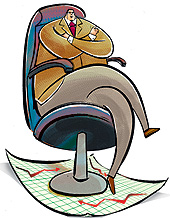 |
| Illustration: Uday Deb |
Former Indian cricket captain Rahul Dravid says there is a shelf life to captaincy in India . This is the period in which you can give your best. “Maybe the shelf life is becoming shorter as time goes by,” he adds.
You won’t find such sentiments in the corporate world. The CEO almost never wants to step down; he only bows to the inevitable under pressure. In family businesses, he continues tugging at the reins even when he may have become certifiably senile. In professional companies, the retirement age is given short shrift.
According to Robert Hogan, a US profiling expert, CEO psychopaths are far from unusual in the corporate world. “There is a thin line dividing the entrepreneurial CEO and the psychopath,” he says.
Psychopaths succeed. They have focus. And their unconcern about broader human values means that they can be ruthless in a corporate environment. Think of the industrialists who exploited their workers (India has dozens of examples) and are regarded as the architects of Indian industry. Even if the workers hate them, other stakeholders are fulsome with their praise.
It would be unfair to single out any of them, seeing that the large mass of industrialists fall in the same category. But one can look at it from the other side.
IT services major Infosys recently acquired a new CEO in Kris Gopalakrishnan. He took over from Nandan M. Nilekani, who inherited the mantle from N.R. Narayana Murthy. All three are members of the original promoter group. The objective is to show that the company doesn’t “belong” to anybody and the top management has a depth of talent.
But this has not been liked by the market. Infosys has stature, so nobody is talking about it openly. But management consultants will tell you in private that this is an insult to the tenets of good governance. “What you are saying is that any one of the promoter group is equally qualified to run the company,” says a consultant. “That’s impossible. You are short-changing shareholders who have invested in Infosys because of its excellent management. You aren’t raising the others to the level of Narayana Murthy. You are lowering him to their level.”
The stock market has given its verdict. The Infosys share is wallowing in gloom even as the Bombay Stock Exchange Sensitive Index is hitting new peaks. There are other reasons for that, of course, the key one being the stronger rupee. But the baton passing at the helm of the company has also played its part.
If you look at other organisations which have CEOs by rotation — chambers of commerce, for instance — you will find reinforcement for the continuity theory. At the two apex Indian chambers — the Confederation of Indian Industry and the Federation of Indian Chambers of Commerce & Industry — professionals run the show. The elected president is merely the front office, needed to deliver sound bytes for TV and to lead delegations abroad. When the president had a bigger role a few years ago, the chambers were a mess. FICCI, for instance, had more bogus members than real ones.
So should cricket be different? Yes, because the comparison is not apt. Though Rahul Dravid is technically CEO of the Indian team while it is playing, at other times he is a line manager. Indian cricket has no CEO. The panjandrums at the BCCI would like to think they call the shots. But their fief is limited.
This is a business bigger than many sectors of industry. It needs a dose of professionalism. Perhaps, Subhash Chandra, who has started a rival cricket league and is a successful CEO of the Essel group, will catalyse the transformation.
Oh CAPTAIN! MY CAPTAIN
Why Rahul Dravid is no CEO
His decisions are limited to the field.
He has only an advisory role in the selection of personnel.
In the corporate world, the CEO gets the kudos for success. Here, individual cricketers get more attention and praise.
Dravid has to be both a successful leader and performer. It’s like asking, say, Anil Ambani to steer his company and also be personally responsible for selling 1,000 connections of Reliance Mobile every day.
The cricket matches as such — during which Dravid is captain — are a very small part of the business of cricket in terms of both money and time. Even if we were to regard Dravid as CEO, his position is that of chief of a Rs 10 crore company in a Rs 1,000 crore group. The fact that the group would not exist without this Rs 10 crore company makes it more important; it does not increase the captain’s powers.
The bigger part of his emoluments comes not from cricket but from endorsements. He has divided loyalties.










